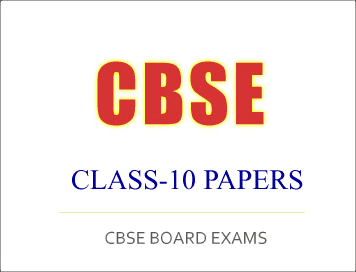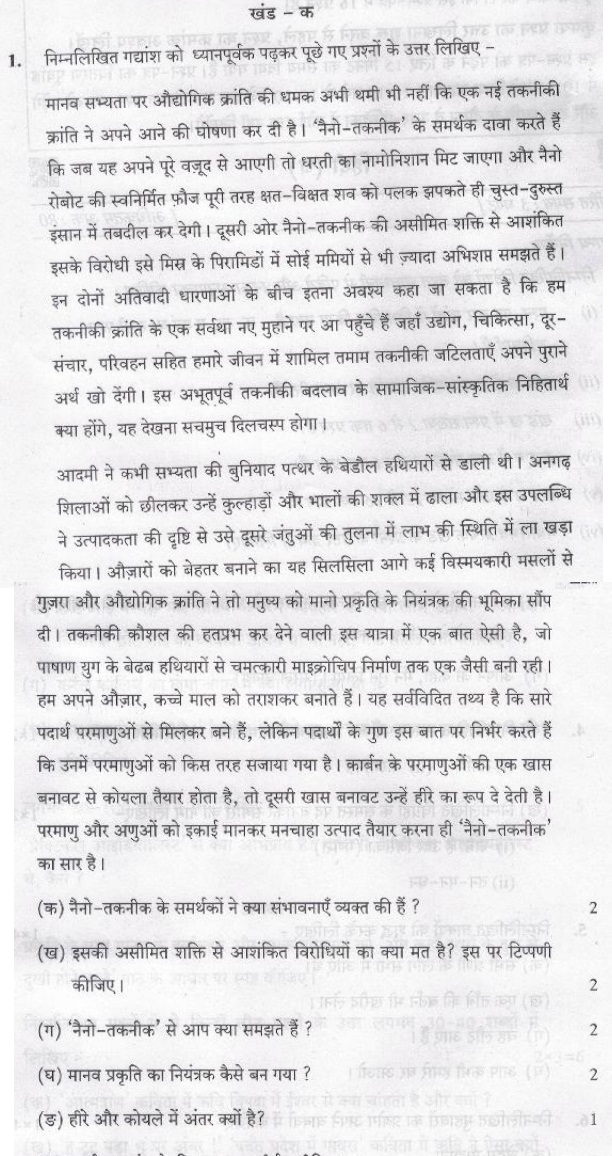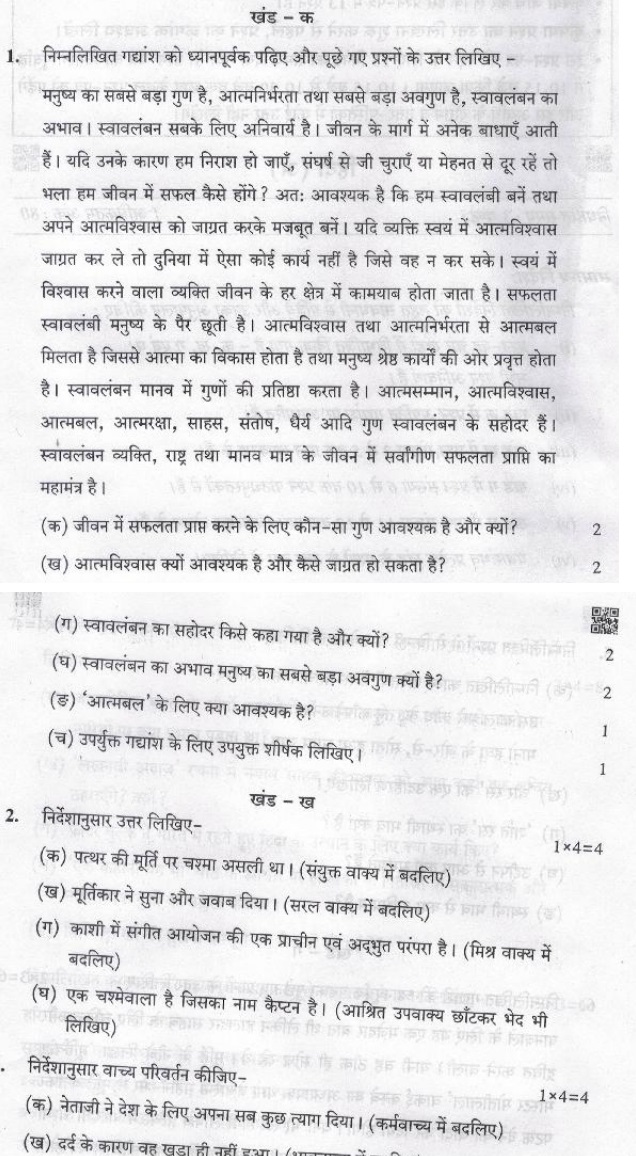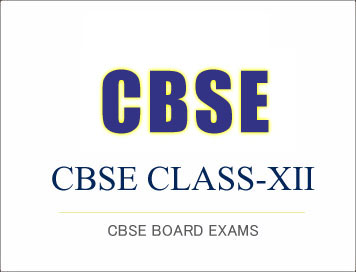CBSE PORTAL : “CBSE Class-10 Exam 2020 : Question Paper (Hindi B)” plus 7 more |
- CBSE Class-10 Exam 2020 : Question Paper (Hindi B)
- CBSE Class-10 Exam 2020 : Question Paper (Hindi A)
- CBSE Class-12 Exam 2020 : Question Paper (English Elective C & N)
- CBSE Class-12 Exam 2020 : Question Paper (English Core)
- (Download) CBSE Class-10 Sample Paper And Marking Scheme 2019-20: Banking & Insurance
- (Download) CBSE Class-10 Sample Paper And Marking Scheme 2019-20: Front Office Operations
- (Download) CBSE Class-12 Sample Paper 2019-20 : Food Production IV
- (Download) CBSE Class-12 Sample Paper 2019-20 : Food Production
| CBSE Class-10 Exam 2020 : Question Paper (Hindi B) Posted: 25 Aug 2020 02:19 AM PDT |
| CBSE Class-10 Exam 2020 : Question Paper (Hindi A) Posted: 25 Aug 2020 02:02 AM PDT |
| CBSE Class-12 Exam 2020 : Question Paper (English Elective C & N) Posted: 25 Aug 2020 01:25 AM PDT
CBSE Class-12 Exam 2020 : Question Paper (English Elective C & N)
SECTION A(Reading Skills)1. Read the passage given below and answer the questions that follow : 10 1 Mr. Mani was having trouble with the porcupines. They had been getting into his garden at night, digging up and eating his potatoes. From his bedroom window, he could hear them enjoying the vegetables he had worked hard to grow. 6 ‘‘Throw water on one and see how it runs! They don’t like getting their quills wet.’’ 1.1 On the basis of your reading of the passage, answer the questions given below : 1x6=6 (a) Why was Mr. Mani troubled by the porcupines ? 1.2 Choose the meanings of the words/phrases given below from the given options : 1x4=4 (a) industriously (para 2) (b) infuriating (para 3) (c) dishevelled (para 4) (d) misery (para 4) |
| CBSE Class-12 Exam 2020 : Question Paper (English Core) Posted: 25 Aug 2020 01:07 AM PDT
CBSE Class-12 Exam 2020 : Question Paper (English Core)
SECTION A(Reading Skills)1. Read the passage given below : 12 Donated Organs and their Transportation 1 Once an organ donor’s family gives its consent and the organs are matched to a recipient, medical professionals are faced with the onerous challenge of transporting organs while ensuring that the harvested organ reaches its destination in the shortest possible time. This is done in order to preserve the harvested organs and involves the police and especially the traffic police department. 2 The traditional method of transporting organs by road is referred to as a ‘green corridor’. This process entails police escorting an ambulance, so as to move around traffic usually a specific traffic lane is chosen and all signals on the route stay green to ensure it reaches its destination in the shortest possible time. A green corridor is a route cleared and cordoned off by the traffic police to ensure the smooth and steady transportation of harvested organs, on most occasions, to those awaiting a life-saving transplant. Organs tend to have a very short preservation time, such as the heart, which has to be harvested and transplanted within four hours or the lungs, which can be preserved for only six hours once they are harvested. 3 The first green corridor in India was created by the Chennai Traffic Police in September 2008 when they accomplished their task of enabling an ambulance to reach its destination within 11 minutes during peak hour traffic. That organ saved a nine-year-old girl whose life depended on the transplant. 4 Similarly, such green corridors have been created by traffic police of various cities such as Pune, Mumbai, Delhi NCR, etc. Personnel are stationed at selected points to divert, control and clear the traffic giving way to the ambulance. Apart from this, a motorcade of police vehicles accompanies the ambulance ensuring that it does not face any problems. Delhi Traffic Police provided a green corridor from IGI Airport to the Institute of Liver and Biliary Sciences in Vasant Kunj for transportation of a liver. The distance of 14 kms was covered in 11 minutes. 5 Experts point out the lack of a robust system to transport organs to super-speciality hospitals in least possible time. The National Organ and Tissue Transplant Organisation (NOTTO), the country’s apex organ donation agency, is now framing a proposal to airlift cadaver organs and will send a report to the Union Health Ministry. ‘‘Cadaver organs have a short life and so transplant should be done within a few golden hours,’’ Director (NOTTO) expressed. ‘‘Therefore, we are preparing a proposal for airlifting organs at any given moment.’’ 6 Most States do not have enough well-trained experts to retrieve or perform transplant procedures. Also, there is an acute shortage of advanced healthcare facilities to carry out a transplant. So, it is referred to other big centres in metropolitan cities. Organs retrieved from Aurangabad, Indore, Surat, Pune are sent to Mumbai as these cities do not have super-specialty healthcare centres, informed officials. 7 ‘‘In India, about fifty thousand to one lakh patients are suffering from acute heart failure and need heart transplant at any point of time. In a private set-up, a heart transplant costs < 15 – 20 lakh, which is followed up by post-operative medication of about < 30,000 per month lifelong.’’ 1.1 On the basis of your understanding of the above passage, answer any five of the following questions by choosing the most appropriate options : 1x5=5 (a) The first green corridor in India was created in (b) The organisation which is framing a proposal to airlift cadaver organs is (c) The onerous task that the author is talking about in para 1 is (d) Most of the people do not go for heart transplant as (e) Most states refer organ transplant cases to big hospitals because (f) Heart retrieved from a body is alive only for _________ hours. 1.2 Answer the following questions briefly : 1x5=5 (a) What is a ‘green corridor’ ? 1.3 Pick out the words from the passage which mean the same as the following : 1x2=2 2. Read the following passage : 8 1 How does television affect our lives ? It can be very helpful to people who carefully choose the shows that they watch. Television can increase our knowledge of the outside world; there are high quality programmes that help us understand many fields of study, science, medicine, the different arts and so on. Moreover, television benefits very old people, who can’t leave the house, as well as patients in hospitals. It also offers non-native speakers the advantage of daily informal language practice. They can increase their vocabulary and practise listening. 2 On the other hand, there are several serious disadvantages of television. Of course, it provides us with a pleasant way to relax and spend our free time, but in some countries people watch television for an average of six hours or more a day. Many children stare at the TV screen for more hours a day than they spend on anything else, including studying and sleeping. It’s clear that TV has a powerful influence on their lives and that its influence is often negative. 3 Recent studies show that after only thirty seconds of television viewing, a person’s brain ‘relaxes’ the same way that it does just before the person falls asleep. Another effect of television on the human brain is that it seems to cause poor concentration. Children who view a lot of television can often concentrate on a subject for only fifteen to twenty minutes. They can pay attention only for the amount of time between commercials. 4 Another disadvantage is that television often causes people to become dissatisfied with their own lives. Real life does not seem so exciting to these people. To many people, television becomes more real than reality and their own lives seem boring. Also many people get upset or depressed when they can’t solve problems in real life as quickly as television actors seem to. 5 Before a child is fourteen years old, he or she views eleven thousand murders on the TV. He or she begins to believe that there is nothing strange about fights, killings and other kinds of violence. Many studies show that people become more violent after viewing certain programmes. They may even do the things that they see in a violent show. (a) One the basis of your reading of the above passage, make notes on it using headings and subheadings. Use recognizable abbreviations (minimum four) and a format you consider suitable. Supply a suitable title to it. 4 (b) Make a summary of the above passage in about 80 words. 4 |
| (Download) CBSE Class-10 Sample Paper And Marking Scheme 2019-20: Banking & Insurance Posted: 24 Aug 2020 10:07 PM PDT |
| (Download) CBSE Class-10 Sample Paper And Marking Scheme 2019-20: Front Office Operations Posted: 24 Aug 2020 10:06 PM PDT |
| (Download) CBSE Class-12 Sample Paper 2019-20 : Food Production IV Posted: 24 Aug 2020 10:05 PM PDT
(Download) CBSE Class-12 Sample Paper 2019-20 :Food Production IVClass: XII SECTION –AAnswer any 10 questions out of the given 12 questions:
2. How many poories can be prepared by 1 Kg atta? 3. Suggest the desired temperature at which meats and tomatoes should be stored. 4. Define food cost. 5. Mention two popular dishes of Bengali Cuisine. 6. List two popular spices used in Kashmiri Cuisine. 7. Name one each staple food of Punjabi and Guajarati cuisines. 8. What do you mean by E-Indent? 9. State two festival dishes of South Indian cuisine. 10. What is Nahari? 11. Indicate two salient features of bulk food production. 12. What is formal buying? |
| (Download) CBSE Class-12 Sample Paper 2019-20 : Food Production Posted: 24 Aug 2020 10:04 PM PDT
(Download) CBSE Class-12 Sample Paper 2019-20 : Food ProductionClass: XII SECTION –AAnswer any 10 questions out of the given 12 questions: 1. What do you understand by Barder? Why is it done? 2. State two important ingredients of crab meat salad. 3. Define Tamiser. 4. What is Mirepox? 5. Name two types of Game. 6. Give the use of cutlet bat. 7. How is pig’s liver different from duck’s liver? 8. Why is spread used for making Sandwiches? 9. List any two vegetables used for making a Ratatouille. 10. Suggest two ingredients used in making Duxelles. 11. What do you mean by Quadriller? 12. Tell the use of lemon zester. |
| You are subscribed to email updates from CBSE EXAM PORTAL : CBSE, ICSE, NIOS, CTET Students Community. To stop receiving these emails, you may unsubscribe now. | Email delivery powered by Google |
| Google, 1600 Amphitheatre Parkway, Mountain View, CA 94043, United States | |




